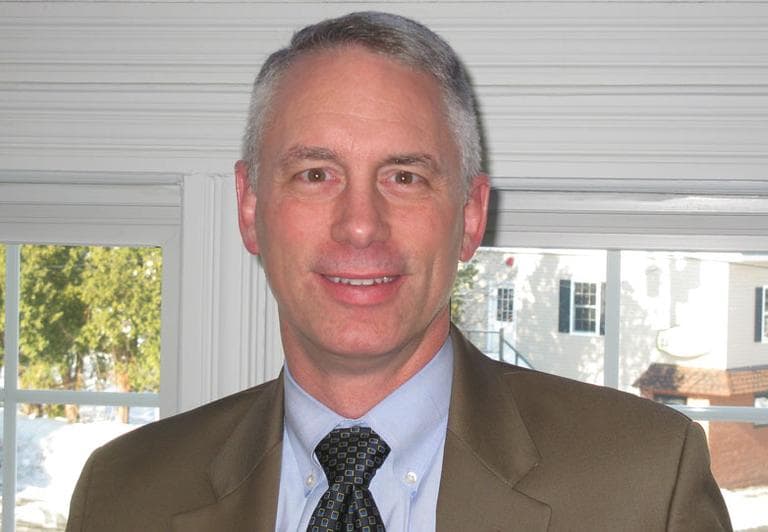Advertisement
Amesbury Mayor Kezer Finds Savings With 'Regionalization'
ResumeTwo years ago, Gov. Deval Patrick announced in the middle of the year that he was cutting aid to cities and towns.
Amesbury’s mayor, Thatcher Kezer, found that all of a sudden he had to cut $800,000 out of that year’s budget. So he looked to a neighbor for help. Kezer called the town manager of Salisbury.
"We got together for lunch," Kezer said. "'Why don’t we figure out what are those services that we’re each doing that we’re really good at, and the others buy it from them?' "

What Amesbury is really good at is emergency services.
"If you’re going to have a heart attack in this part of Essex County, " Kezer said, "you want to have it in Amesbury, because you’re going to get the best service."
But now the surrounding towns, too, get the benefit of Amesbury’s paramedics, who provide advanced life support.
Even so, Kezer found that joining with these other towns was a lot easier said than done.
"Everybody’s in favor of improving efficiencies in government," Kezer said. "Everybody’s talking about 'regionalizing,' getting more bang for your buck, making these changes — until you actually try to do it. The same critics that were complaining about not doing enough to control our costs — 'Gotta come down hard on the unions, you’ve gotta do all these things' — were the same critics that came up, 'How dare you lay these people off? How dare you change this on us?' "
Kezer laid off 18 people, or 10 percent of the city's non-school workforce. He eliminated seven positions in the Department of Public Works, four firefighters, the health nurse, the health inspector and the secretary to that department, as well administrative staff throughout city government.
Kezer says Amesbury now saves $100,000 a year in health services. But his critics accused him of sacrificing residents’ needs.
"The way it was presented is that the mayor eliminated the entire health department with no plan, and [was] jeopardizing the health of the entire community," Kezer said. "No, we have a plan. I’m a military planner. On my military side, that’s my profession."
Another way Kezer saved money was to fire Amesbury’s full-time restaurant inspector. He was paid $70,000 a year in salary and benefits, and only got around to half the needed inspections. Restaurant owners complained that the system was so inefficient that it made it hard to open for business. So Kezer hired a contractor for $5,000 to $6,000 a year. In a matter of months, the backlog of restaurant inspections was cleared up.
“It takes political leadership and a real tough skin to go through this, but as a community, we are seeing the payoffs now.”
Amesbury Mayor Thatcher Kezer
"So the way I like to put it is we doubled productivity at about one-tenth of the cost," Kezer said.
Today, Jack Morris does the restaurant inspections. He is Amesbury’s health director. Kezer saved money by sharing him with neighboring Salisbury. The streamlined inspection services that came out of regionalization have fueled the growth of restaurants in downtown Amesbury.
"Seven years ago, we were one of the what, four restaurants in town?" Jeffrey Nahas, one of the owners of the Ale House, a new restaurant on Amesbury's thriving Main Street, said. "Now it’s boomed. It’s amazing. And that’s partly because you’re able to do it now. There are systems in place. And I think that’s where we’ve really grown. That’s the biggest change, is the ease of getting the information you need in order to do a good job."
It wasn’t just the locals who resisted Mayor Kezer’s attempts to go regional.
Cheryl Sbarra, of the Massachusetts Association of Health Boards, was concerned when Kezer stood up at a meeting of the Amesbury Health Board and said that unlike schools, fire, police and public works, public health was not a core town service. She’s been following Kezer’s efforts to regionalize.
"And I think they’re getting there," Sbarra said, "and I think that inspectional services are working. I’m not sure what kind of preventive or proactive health services are taking place."
Amesbury’s EMTs and paramedics did step in to vaccinate people against the H1N1 flu.
Despite the gains Kezer has made, he remembers vividly that when he first started to merge town services with Salisbury, he met resistance within the Patrick administration, even though the governor is pushing regionalization.
"Some parts of the bureaucracy in the Department of Public Health didn’t want to see layoffs," Kezer said. "It takes political leadership and a real tough skin to go through this, but as a community, we are seeing the payoffs now."
The payoffs come in the form of free cash, the amount of money Amesbury has left over at the end of the year. It went from having no free cash to $1 million. It’s also built up its rainy-day fund. And it used to tax property owners to the hilt. Now, it does not have to.
This program aired on February 16, 2011.
